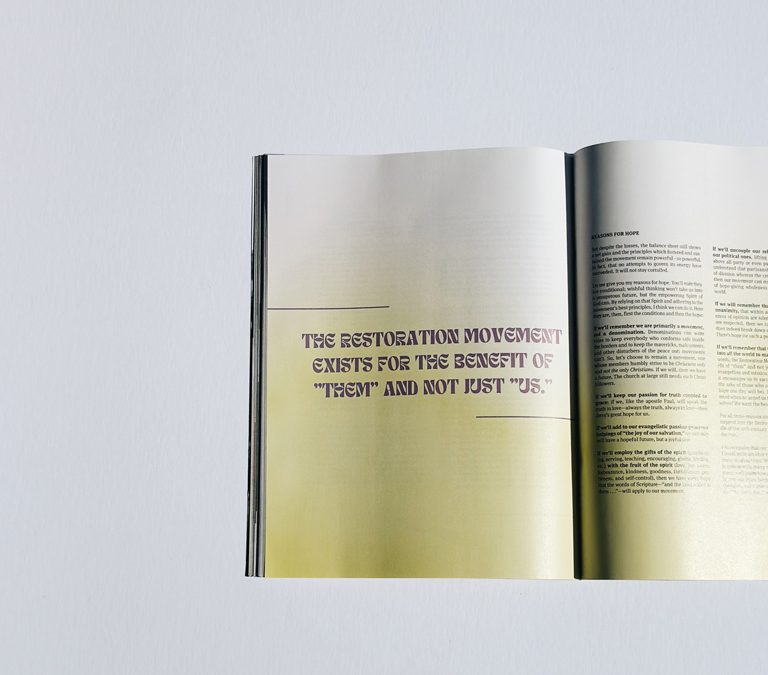By Rick Grace
It was a disturbing trend. Even more disturbing was that only a few people seemed aware of it or concerned by it.
It was 1985. The turn toward progressive theology was becoming even more pronounced in the Christian Church (Disciples of Christ). In response, the board of the First Christian Church (Disciples of Christ) in Decatur, Illinois, offered a simple resolution—Resolution 8516—asking the Disciples of Christ biennial General Assembly to “affirm that the belief in the inspiration and infallibility of Scripture continues to be a viable option” for today’s Disciples. That such a resolution was needed was disturbing. Even more disturbing was the resolution being overwhelmingly defeated.
A HEART FOR RENEWAL
Disciple Renewal (DR) was born that year, with Richard Bowman, Dr. Doug Harvey, and Kevin and Linda Ray being the primary founders. The goal was to foster spiritual renewal in the Christian Church (Disciples of Christ) based on the conviction of the Bible being the authoritative and infallible Word of God. DR would continue to raise concerns and issues within the denomination using the main platform available—the resolution process of the General Assembly.
In 1987, 22 churches cosponsored a resolution (Resolution 8728) asking the General Assembly to “reaffirm the historic faith of the entire Christian Church in general and the Christian Church (Disciples of Christ) in particular, that Jesus Christ is the only Savior of the world, and that apart from him there is no salvation.” Again, that such a resolution was needed was disturbing. Even more disturbing was the resolution being referred to the Commission on Theology for two years of study.
At the 1989 General Assembly, the Commission presented their report without consulting any of the 22 sponsoring churches. Those who raised the original question were quite disturbed to be excluded from the process and from having any input into the final report. Among other questionable portions, the sponsors of the resolution certainly would have rejected this line from the report: “Christians have reason to trust that, by God’s mercy, no human being is ultimately rejected and nullified by God.” In response to objections, both on the Assembly floor and in print, the resolution’s sponsors were repeatedly told this was not a statement of universal salvation, but how could it be seen otherwise?
A TIME OF DEPARTURE
As Disciple Renewal, we continued working in and through whatever venues were open to us within the Disciples and among other like-minded evangelical churches. But the doors within the Disciples were rapidly closing. In 1997, the procedures of the General Assembly were changed. Until then, a church or churches or recognized units within the Disciples could author a resolution that would be presented to the General Assembly. Starting that year, resolutions had to be approved by the General Board of the Christian Church (Disciples of Christ) before they could go to the Assembly floor. It became apparent no resolution giving voice to evangelical biblical concerns would ever see the light of day. It was time for a new chapter.
The Disciple Renewal board, meeting on the campus of St. Louis Christian College in 1997, established a new trajectory. Disciple Renewal would be no more, for the goal of renewing the Disciples was abandoned. The Disciple Heritage Fellowship (DHF) was born. The name was carefully chosen.
Disciple with no “s” indicated we no longer had a direct connection to the Disciples, yet recognized the reality most of us and the churches we represented were at one time Disciples churches. Even today, roughly 20 percent of the churches in the DHF network have stayed within the Disciples. Many are open about their connection to DHF; many fly under the radar, fearing repercussions from denominational and/or regional structures. For our part, DHF is committed to partner with any church turning to us, regardless of their denominational connection.
Heritage pointed to our continuing embrace of the ideals of the Stone-Campbell Movement. We are firmly rooted in the ideals of the American Restoration Movement. Our commitment to this rich heritage continues.
Fellowship declared we were not becoming another denomination but rather a voluntary connectional fellowship of churches, pastors, and congregational members. We are committed to sharing ministry, mission, and resources within this fellowship. We foster networking between leaders and churches to further the cause of Christ. This is captured in our mission statement: “It is the mission of Disciple Heritage Fellowship to encourage, strengthen, and lead Churches to fulfill Christ’s mission.”
ISSUES RELATED TO UNITY
DHF leadership has been asked over the years why our churches don’t simply become “independent” Christian churches. Forty years ago, it wasn’t that simple. There was some lingering misunderstanding, if not animosity, leftover from the church fights of a previous generation. More importantly, two significant issues stood in the way.
One was baptism. Many DHF churches practiced, and still practice, open membership. While baptism by immersion is taught as the biblical mode, many of our churches allow membership to be extended to those Alexander Campbell called “the pious unimmersed.” Church membership can be extended to those who had been “baptized” by a mode other than immersion. Baptism, viewed as the first step of obedience following the embrace of salvation in Christ, was not seen as a part of the salvific process. This position led to some lively discussions with many on the Christian Church and Church of Christ side of the street!
The other issue was the role of women in leadership in the church. Many DHF churches had embraced a more egalitarian view and had women serving as elders and even pastors. Most Christian Churches and Churches of Christ had a much more complementarian view which would not allow women to hold those leadership positions. Many DHF churches still hold a complementarian position, and it seems an increasing number of Christian Churches and Churches of Christ are adopting a more egalitarian stance. As a connectional fellowship, we do not dictate theological positions or polity matter to any of our churches. We guard freedom in Christ beyond the core essentials we identify (enumerated at www.discipleheritage.org/beliefs).
By 2018, the DHF ministry was languishing; it was significantly underfunded. Some on the board were asking if God was done with DHF . . . if God had brought us into existence “for such a time as this,” but that time was over. The board entered a season of prayer and fasting, seeking God’s heart and direction for this ministry. We judge God spoke clearly to us at that point, that he was not done with DHF, and that another season of growth would happen.
To stabilize the ministry and to breathe new life into it, the decision was made to move DHF under the umbrella of the First Christian Church of Decatur, Illinois. Decatur First was, and still is, the flagship of the DHF network of churches. Dr. Wayne Kent, lead pastor of the church, became executive director of DHF. We knew that was unsustainable in the long run, but it was very much needed in the short run. An unexpected gift from the estate of longtime supporters of DHF provided funds for the ministry to hire a full-time staff person. Dr. Rick Grace, as “church liaison” (his official title), serves as the go-between of Decatur First and the DHF network of churches and pastors. With a full-time staff position secured for two years, the ministry started to move forward once again.
The “season of growth” anticipated from the board’s time of prayer and fasting started right before the COVID mitigations shut everything down. Clearly God was not bound by the pandemic; churches, especially churches still within the Christian Church (Disciples of Christ), began reaching out to DHF. Among the requests, many were for help in navigating the murky waters of ever-increasing theological progressivism, and many were for help in learning how to leave the denomination in a way that would protect the church.
Requests for these kinds of assistance have increased over the last two years, and especially since the 2023 General Assembly of the Christian Church (Disciples of Christ) meeting in Lexington, Kentucky, in late July. The Disciples Alliance Q decision to host a drag queen at the Assembly (performing under the name of Miss Penny Cost) was the last straw for many more conservative Disciples. It was further confirmation of the Disciples’ complete embrace and support of the LGBTQIA+ agenda. Though the Disciples voted at the 2013 General Assembly to ordain candidates for ministry regardless of their sexual orientation or gender identification, this drag performance was viewed by more conservative Disciples as an “in your face” event.
A second line in the sand for many conservative Disciples at the 2023 General Assembly was passage of an “emergency resolution” called “An Invitation to Oppose Anti-trans Legislation and Affirm the Dignity of Transgender and Gender-diverse People.” The resolution cites “an unprecedented amount of anti-transgender legislation . . . and anti-healthcare (especially prohibiting trans children from receiving medically-indicated treatment) . . . bills.” It encourages churches to “stand in solidarity with transgender and gender diverse individuals against harm being done against them often with the misuse of religious texts and symbols.” Conservative Disciples pastors and churches have rejected this invitation. And again, many of them have turned to DHF for help.
SERVING CHURCHES, EXTENDING THE KINGDOM
DHF is committed to partner with churches from any strand of the Restoration tradition. We have been very intentional about strengthening our relationship with the Christian Churches and Churches of Christ. At the DHF ’22 National Conference, Dave Stone, former lead pastor of Southeast Christian Church in Louisville, Kentucky, was our keynote speaker. At DHF ’23, Rick Rusaw, executive director of the Spire Network, was our keynoter. That we have initiated steps to deepen this partnership is evidenced by our recent keynoters and the DHF presence at the most recent Spire Conference in Nashville, Tennessee.
DHF is now in a stronger position to serve the church and enhance the kingdom of God. We will continue to respond to requests from churches to help them along their journey as well as to strengthen our strategic partnerships with other Restoration churches. From the common ground of the essential truths of the historic Christian faith, DHF actively seeks to be used of God to fulfill the prayer of Jesus, “that they may all be one, just as you, Father, are in me, and I in you, that they also may be in us, so that the world may believe that you have sent me” (John 17:21, English Standard Version).
Rick Grace serves as church liaison with Disciple Heritage Fellowship in Decatur, Illinois.





0 Comments